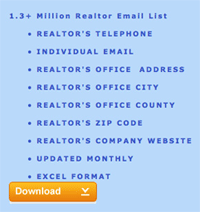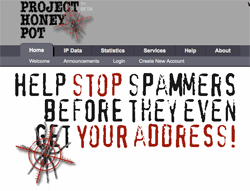The real estate business is extremely competitive and every realtor has to work hard to maintain their visibility, prominence, and clientele. From the renter of the tiny studio apartment all the way to the owner of the largest and most luxurious mansion, the requirement for housing is universal. Everyone has to live somewhere, so at the most basic level real estate can be considered the ultimate horizontal industry with appeal to every adult on Earth. While more specialized industries both on the B2B and B2C departments target primarily the individuals who are in the market for their specific wares, real estate can target everyone. The determination of whether leads are in the specific market niche is not as critical in real estate as in more vertical industries. Given these necessities, it is not surprising that the purchase or rental of email address lists is more widespread among real estate professionals than in virtually any other sector.

A Google search for real estate email lists produces over 200 million results. There are countless lists available for sale or rent to suit every segment and every geographical location. Without exception each of these lists should be considered pure real estate poison. Any real estate professional who has compiled a legitimate list of email addresses for their own purposes has created a valuable asset. These prospects can be regularly approached to build relationships and develop listings and sales. They have received permission from each of the individuals to send them emails at predetermined intervals from that specific brand.
When a list such as this is sold, the relationship is immediately and irrevocably ruined. Even if you are buying a list from the same geographical location as your own market territory, the problem remains that X Real Estate received permission for the sends and now the prospects are receiving emails from Y Real Estate. That represents a violation of the permission agreement. Another factor is the question as to why X Real Estate is selling their list to a competitor at all. Have they already mercilessly email-blasted the recipients to the point where they have unsubscribed en masse?

The
U.S. CAN-SPAM Act is an opt-out form of legislation, which essentially means that you can send anything to anyone but you have to take them off your list once they demand it. When you buy a list you have no certain way of knowing who has opted-out already. Sending emails to those addresses can result in complaints directly to Federal authorities. Convictions under the Act can be devastating to anyone as they are accompanied by heavy fines and prolonged prison terms.
Even if the government does not get involved, you will be facing obstacles with your email reputation. Traffic routing ISPs take careful note of individual IPs that resend mail to blocked and non-existent email addresses: a primary feature of almost all purchased email lists. Along with the hard bouncing dead addresses come the dreaded "spam honeypots." These are addresses set up exclusively to serve as traps for unsuspecting emailers. When these innocuous-looking email addresses find their way onto a real estate list they immediately flag the ISPs that the sender is working from an email list that they did not properly accumulate. There is no easy way around these honeypot traps, as Project Honey Pot states that there are currently 65,961,000 Trap Addresses Monitored (out of a Trap Monitoring Capability of 543,660,000,000).

The provision of services by Benchmark Email is always contingent on the ethical and fully licit propriety of all aspects of list gathering. Benchmark Email meticulously protects its online reputation in order to ensure elevated levels of deliverability to its various clients. Therefore it must carefully review the applications of all businesses, including real estate companies, to ensure that all list subscribers are legitimately garnered.